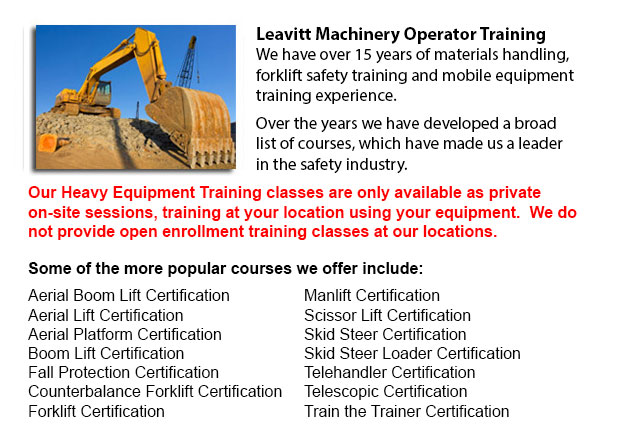
Heavy Equipment Training Courses Regina - When choosing a heavy equipment operator course, the first step must be to figure out the capacity in which you will be working with heavy machines. You could find the best course to teach you how to operate the machinery or to fix these equipment. Many choices are available, be certain to align your career goals and your research so you could determine what classes will be most appropriate for you. It is essential to select classes that are recognized and approved by the local governing bodies within your region.
The kinds of various heavy equipment certifications differ very much. The majority of operator training courses would be particular to the type of machine you would like to operate. Courses offered for crane operator certification would be different than the course provided for forklift certification. Crane certification will enable you to safely operate a crane, while the latter would enable you to handle different types of materials handling equipment. It is a good idea to check with your existing employer before enrolling in whichever classes to be able to ensure the ones you pick will complete the training requirements your employer has set out for you.
Heavy Equipment Operator Training
HEO or the heavy equipment operator courses will provide you with the skills and knowledge needed so as to enter the workforce as an entry level heavy equipment operator. In this 12 week course along with a practicum, you will focus on jobsite fundamentals including: environmental, safety and health awareness and training, machinery operation and maintenance, and use of earth moving techniques in hands-on conditions.
This training helps you to operate on selected things of equipment such as a compactor, loader, excavator, dozer and a grader. There are some vital skills required to become a heavy equipment operator: excellent problem solving skills, excellent oral communication skills, excellent spatial ability and excellent vision, physical stamina and strength, the ability to work well with others in a team or alone and good manual dexterity along with good eye-hand coordination.
Technical skills are likewise required to operate these machines. These skills include: being able to operate equipment and power tools, general mechanical ability, knowledge of safe working practices, the ability to follow grade plans, technical specifications and read instructions, the ability to make basic measurements and mathematical calculations, and the ability to carry out basic maintenance and mechanical repairs.
-
Forklift Training Classes Regina
Forklift Training Classes Regina - Forklifts are a kind of heavy lifting equipment used in order to move and handle material efficiently and safely. Sometimes called Lift Trucks, they are made use of in different industries. Employees working with an... More -
Crane Certification Regina
Crane Certification Regina - The Crane Certification Program covers the industry suggested content which would teach the safe and efficient operation of cranes. The person will train in the following: pre-operational, operational and post operating r... More -
Telehandler Training Courses Regina
Telehandler Training Courses Regina - Employers are responsible for making sure that their operating personnel and supervisors are trained to work proficiently utilizing telehandler machines. The competence level of employees need to be assessed. If... More -
Operator Safety Training, Re-Qualification Training, In-House Instructor Training in Regina
Lift trucks are utilized in just about all industrial construction sites and in warehouse operations and in boat yards. The reach feature of a lift truck is a very important component utilized in a variety of applications like for instance when a she... More -
Heavy Equipment Operator Training Regina
Heavy Equipment Operator Training Regina - Training facilities that offer good standards in the business and not only provide field performing tasks but additional equipment training are highly sought after. Accredited schools offer students the know... More -
Wheel Loader Operator Training Regina
Wheel Loader Operator Training Regina - Cranes are industrial machines which make use of pulleys or levers so as to lift considerable loads. The Roman people utilized cranes in order to put up big monuments, that means these machines have been existi... More -
Crane Safety Training Regina
Crane Safety Training Regina - Both crane driver as well as their supervisors need to know all the possible problems connected to the operation of an overhead crane. All over North America, there is legislation that provides regulation for the safe o... More -
Scissor Lift Safety Training Regina
Scissor Lift Safety Training Regina - A Scissor Lift is a functional kind of platform that normally moves in a vertical direction. The machinery is capable of this movement due to the use of folding supports that are linked in a criss-cross pattern c... More

Forklift Training Regina
TOLL FREE: 1-888-254-6157
Regina, Saskatchewan
forklifttrainingregina.com
Email Us
About Us



